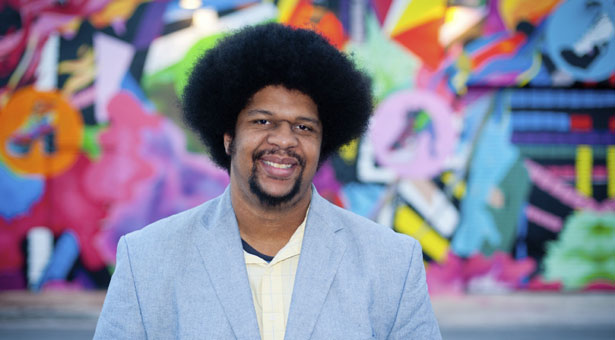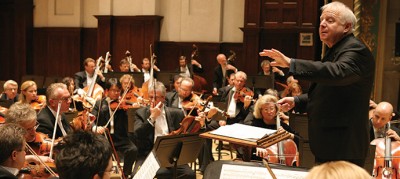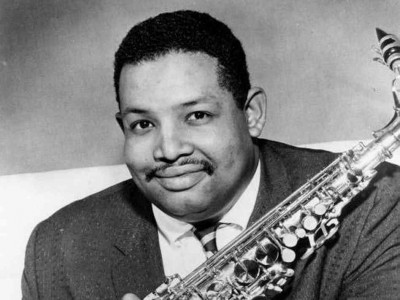
Composer Taylor gets world premiere on Festival Miami’s opening night
Matthew Evan Taylor.
The 2014 edition of Festival Miami opens Friday night with a concert by the University of Miami’s Frost Symphony Orchestra in an all-American program of 20th and 21-century music.
Thomas Sleeper leads the Frost in two concerti, the Alto Saxophone Concerto of the now-overlooked composer Paul Creston, with Dale Underwood as soloist, and Samuel Barber’s popular Violin Concerto, with Michael Ludwig handling the solo duties.
The concert will open with Leonard Bernstein’s overture to his operetta Candide, and there will be two works by uncompromising composers of the early 20th century: Charles Ives, who will be represented by The Unanswered Question, and Carl Ruggles, whose Sun-Treader will open the second half.
The concert also will include, between the Bernstein and the Creston, the world premiere of a Boston-born, Alabama-raised composer named Matthew Evan Taylor, a 33-year-old University of Miami doctoral student whose contribution to the concert will be a powerful, colorful tone poem called Three Glorious Days.
Taylor, a saxophonist who spent five years touring as a member of the alt-rock band Moses Mayfield before their breakup in 2007, moved to Miami in 2009 to study composition. He’s had works performed by the Cleveland Orchestra, the Imani Winds, and the Detroit Symphony, which performed Three Glorious Days earlier this year in a read-through session as part of its work on behalf of EarShot, a national program for rising orchestral composers.
Taylor’s first ballet, Elvrutu’s Fall, premiered in 2013 as part of the Knight-supported Miami Light Project’s Here and Now series.
“I think there are some fascinating voices on the scene right now. This is the century of the big-eared composer; we’re soaking up all the music around us,” Taylor wrote in an email Tuesday. “There’s no telling what will come out, but it will be exciting.”
Taylor said the title of his piece refers to France’s July Revolution of 1830, which overthrew King Charles X and installed his cousin Louis-Philippe in his stead until 1848. But Taylor said his work is not specifically about that event; it’s more of a commentary.
“The piece does not directly reflect the July Revolution. It is not purposely constructed to reflect three different days (though people have tried to convince me otherwise). I wanted to reflect the persistence of the status quo, even in the face of violence,” he wrote.
“I wrote this piece during the 2012 presidential election, a process I once heard called a ‘peaceful revolution.’ Both sides cast the other as the end of the American way of life and not true Americans,” Taylor wrote. “But once the result was settled, nothing really changed. Even the promises for a more collaborative atmosphere in Washington quickly dissolved.”
Taylor submitted the piece to the Detroit Symphony’s EarShot program, which was looking to feature four emerging African-American composers in readings with conductor Leonard Slatkin.
“I normally stay away from calls like this, because my identity is so much more than my skin color, but my music was evaluated by some of the most prolific and esteemed composers working today – Gabriela Lena Frank, Bright Sheng, Carman Moore and Derek Bermel – and a reading by the DSO is an opportunity that can’t be ignored,” he wrote.
Leonard Slatkin and the Detroit Symphony Orchestra.
The readings, which took place in March (an excerpt is available on Taylor’s website), provided Taylor with the opportunity to meet with his fellow participants, as well as Slatkin and the members of the orchestra.
“Perhaps the biggest lesson that keeps popping up at these events is that a composer is not alone,” he wrote. “There’s always someone who can give you some advice, or knows how to do something in a more efficient way. And there are people who will rely on you for your expertise.”
Taylor said rehearsals for the Festival Miami performance of Three Glorious Days “have been phenomenal.”
“Thomas Sleeper has shown great sensitivity in his approach. It has been a valuable experience, because a new piece is normally not rehearsed as often by an orchestra as mine has been by the Frost Symphony Orchestra,” Taylor wrote. “It has been gratifying to hear what Thom has discovered about my piece, and to see that the musicians are taking my music seriously. This has been a gratifying experience. Professor Sleeper even allows me to conduct the orchestra while he checks balances. I couldn’t be treated better by an ensemble.”
Although Taylor is drawn to “multidisciplinary projects like ballets and operas,” he appreciates all compositional genres.
“The main criteria is whether the material interests me. As of late, I have experimented spatially conceived music which places the audience in the middle of an ensemble,” he wrote, such as a piece called Revelry of the Deep, for four saxophone quartets, which premiered in December at Gusman Hall.
His early influences as a teenage saxophonist included jazz masters such as Cannonball Adderley and Ornette Coleman, and he finds himself still drawing on their example today.
Juilan “Cannonball” Adderley (1928-1975).
“An uncle made me aware of Cannonball Adderley when I was a freshman in high school. I was immediately drawn to Cannonball’s warm, boisterous sound, and stunningly original lines. I stumbled onto the music of Ornette Coleman by raiding my father’s music collection,” Taylor wrote. “With Ornette, I felt at the time that his music was some sort of sorcery. He wasn’t as technically gifted as Cannonball, but he re-contextualized the same blues influence and showed what else was within the notes …
“Now that I’m older and my musical focus is different, and perhaps wider, I still find inspiration in both men. Aside from their intellect, Ornette and Cannonball were my first teachers in melody and phrasing. They still teach me the importance of a well-placed accent and how to color a line.”
That’s not to say those influences are obvious in the music.
“I acknowledge that I borrow from my experiences as a jazz and rock musician, but not in the way most people think. The lessons about melody I learned from my jazz heroes were used in the construction of ‘Three Glorious Days,’ but I doubt anyone would have known that if I hadn’t told them,” he wrote. “It’s not a jazzy-sounding piece.”
In May, Taylor will get his doctorate from UM, but he’ll also be spending the year as artist-in-residence at Cannonball Miami.
“I also have projects in the works with my main collaborators in New York, Ferrán Martín and Priscilla Marrero. Ferrán is a visual artist and Priscilla is a choreographer and performer, and together we create socially conscious installations. We call ourselves [ce n’est pas nous]. We have already won a grant to present new work here in Miami this winter, and have already presented our work in Boston and Paris,” he wrote.
American classical music composition has a long and rich history, and Taylor is hesitant to agree with a suggestion that this form of our cultural identity has had a low profile.
“In America, the profile of new classical music, American or otherwise, has always been secondary to the European masters. However, you compare the name recognition of John Adams, Pulitzer Prize-winning, renowned orchestral and operatic composer, to Tristan Murail, one of the founding composers of what’s called Spectralism, (and) more Americans would know Adams over Murail.
“It’s probably the reverse in Europe. The funny thing is, Murail had been a professor here in the U.S. for over a decade,” he wrote. (Murail taught at Columbia University until 2011.)
Nevertheless, it can be tough to get your message out.
“The sad fact is, in the concert halls, orchestras rely on the tried-and-true composers: Beethoven, Mozart, Tchaikovsky and the like. So living composers get short shrift,” he wrote. “But, still there are composers other than Mr. Adams that are making a living solely on their work. There are the usual suspects like Philip Glass and Gunther Schuller, and then there are younger ones like Missy Mazzoli, Nico Muhly and Mohammed Fairouz.
“The best policy is to write music, get it performed, and the fame and notoriety will work themselves out,” Taylor wrote.
The opening Festival Miami concert is set for 8 p.m. Friday at Gusman Hall on the campus of the University of Miami in Coral Gables. Tickets range from $25-$45. Call 305-284-4940 or visit www.festivalmiami.org.
Recent Content
-
Artsarticle ·
-
Artsarticle ·
-
Artsarticle ·


